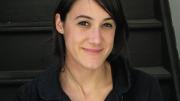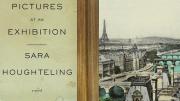Even before she started writing a novel about France during and after the Second World War, Sara Houghteling ’99 felt as if she’d been there. Her grandparents, who had lived in Paris (her grandfather was working for the Marshall Plan), filled her head with stories about foreign aristocrats, rationing, and Parisian men who could peg her grandmother as an American by her shining hair. (Who but an American would have shampoo?) Houghteling’s forthcoming debut novel, Pictures at an Exhibition (Knopf), weaves such family memories into a larger story about a young man trying to recover his father’s lost art collection.
Her narrator, Max Berenzon, is the son of a famous Jewish art dealer who, for reasons Max doesn’t understand, refuses to hand him the family business. Unhappily enrolled in medical school, Max spends more time falling for Rose Clément, his father’s assistant, than he does on his studies. The German invasion upends all their lives: the Berenzons hide in the country while Rose works in a museum, surreptitiously making records of the Nazis’ looting. (Of the more than 100,000 pieces of art stolen from French collectors during the war, some 40,000 are still unaccounted for.) After the war, Max wanders through Paris, looking for Rose and for his father’s paintings.
Houghteling began writing the novel seven years ago, but has been researching it even longer. She concentrated in English and applied to write a creative thesis “with some very loose, strange proposal that I write a series of short stories based on Manet paintings,” she remembers. “Fortunately I wasn’t accepted.” (She examined museums in Henry James’s The Golden Bowl and The American instead.) But Manet—along with Picasso, Matisse, and Degas—appears in the novel through the paintings that line the Berenzon gallery walls.
Those paintings supplied a wellspring of inspiration. “Every time I was stuck in my novel, I would write a scene based on a different missing painting,” Houghteling says. One of those scenes, written about Woman in White by the Impressionist Berthe Morisot, survived her rigorous private editing, which nearly halved her original, 450-page manuscript.
Years before completing her novel, Houghteling shared early chapters with professors and fellow master of fine arts students at the University of Michigan. (She attended the program between 2001 and 2003 after teaching for a few years, first at the American School of Paris and then at her former high school in Brookline, Massachusetts.) Michigan awarded her a summer research grant for travel to Paris, and, after receiving her M.F.A., Houghteling won a Fulbright that allowed her to return to France for a full year.
She had first traveled there as an undergraduate, writing for the student guidebook series Let’s Go (see “A Pact with Solitude,” November-December 1998, page 102). But on her later trips, she traded scoping out beaches and restaurants for interviewing survivors and descendants of the Parisian postwar art community. She met a lawyer, Marianne Rosenberg, whose collector-grandfather Paul became the model for Max’s father. Knowing Marianne helped Houghteling piece together a tricky character: “Seeing her gave me a glimpse of what her grandfather was probably like—someone with a lot of humor and a formidably sharp intellect.”
Rose Clément, the object of Max’s affection, is also based on an historical figure. Rose Valland was a curator who managed to stay on at a museum after the Nazis had kicked out other French workers. She catalogued the Germans’ thefts and devoted much of her later life to tracking down the stolen art. But despite her heroism (and an autobiography), Valland remains largely unknown. “I remember seeing a picture of her in which she’s very unassuming,” wearing what looked like men’s clothing, says Houghteling. “I wanted to find out more about her. On the Internet there was nothing, nothing, nothing.” She found at least a partial answer when she learned, at a posthumous exhibition honoring Valland in her hometown, that the former curator of the Louvre had a long-time gay lover. “Ah ha!” Houghteling thought. “This is why I couldn’t find anything! History has kept her closeted…for 60 years.”
Houghteling also spent hours combing through the archives at the Center for Contemporary Jewish Documentation in Paris. She tried to get a sense of what it must have been like for French Jews to return to the capital city and search train records for the names of friends and family members who weren’t able to escape the German round-ups. “Ultimately, [this] is a work of fiction,” she says. “But I think, in writing about the Holocaust, you have a responsibility to be as truthful to the details of the war as possible.”
Such exhaustive research impressed an editor at one publishing house so much that she asked if Houghteling would be willing to rewrite the book as nonfiction. Houghteling declined. People’s psychological motivations, unavailable to historians, are what she says she really wants to explore. “We’ll never know what anyone else’s inner life is like,” she contends. “Fiction lets us imagine the answers.”







